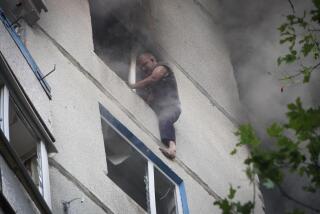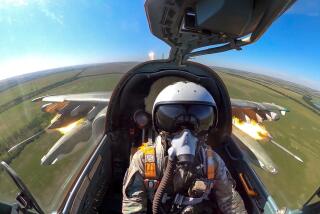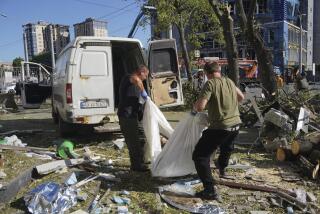Toll Rises in Ex-Soviet Areas’ Ethnic Warfare : Unrest: Four die in Moldovan clashes, while shelling reportedly kills up to 50 in Karabakh.
- Share via
MOSCOW — Ethnic fighting flared in a southwestern splinter of the former Soviet Union on Monday, while continuing battles brought dozens of new deaths in the Nagorno-Karabakh region, where an Afghanistan War hero was dispatched by Russia to withdraw the last of the Soviet troops.
In a breakaway section of the former Soviet republic of Moldova, clashes between separatists and police left four dead, including two Cossacks; 15 people also were injured, according to reports from the region, near the Romanian border. Moldovan President Mircea Snegur’s spokesmen complained that the unrest was timed to embarrass him just as he accepted U.N. membership for Moldova on Monday in New York.
For the record:
12:00 a.m. March 4, 1992 For the Record
Los Angeles Times Wednesday March 4, 1992 Home Edition Part A Page 3 Column 1 Metro Desk 2 inches; 44 words Type of Material: Correction
Deadly site--A photo caption in Tuesday’s Times incorrectly located the site where an Azerbaijani policeman was removing the body of a child, allegedly killed in what Azerbaijan officials have termed an Armenian massacre. The hillside was near the village of Khojaly in the disputed enclave of Nagorno-Karabakh.
In Nagorno-Karabakh, where a bitter territorial dispute has cost more than 1,000 Armenians and Azerbaijanis their lives over the last four years, up to 50 people were reported killed in weekend shelling of the predominantly Azerbaijani town of Shusha.
Gen. Boris Gromov, who led the Soviet withdrawal from Afghanistan and was himself the last man to leave, was charged with bringing out the 366th Motorized Infantry Regiment, the last former Soviet unit remaining in Nagorno-Karabakh, according to Russian Television.
Russia, reluctant to remain embroiled in the ethnic bloodshed unleashed by the Soviet Union’s reforms and subsequent collapse, is withdrawing the regiment, despite the danger that its departure could remove the last buffer between the warring Armenians and Azerbaijanis in the mountainous enclave.
Armenian President Levon Ter-Petrosyan said Monday that the regiment has been “a stabilizing factor” and its withdrawal was “not well thought out. . . . Taking this division out could further destabilize the situation in Nagorno-Karabakh.”
But the regiment had been under orders since late last year not to interfere in the Nagorno-Karabakh fighting and forced to passively undergo shelling that has killed or wounded several soldiers.
Its withdrawal was reported already under way Monday, with columns of troops and equipment headed out of the mountainous region under heavy cover and with no interference from local militants.
Russian President Boris N. Yeltsin, who has said openly that he sees no reason why “Russian boys” should die in others’ battles, left Monday for a planned two-week vacation in the Black Sea resort town of Sochi.
Meantime, Azerbaijani accusations also mounted Monday of a massacre in the Nagorno-Karabakh town of Khojaly, where Azerbaijani officials say that 1,000 people died in an Armenian attack last week. Armenia denies that anywhere near as many people died when its militants took the town.
Western reporters in the region said they had seen dozens of Azerbaijani corpses, but they had no official death count.
The fighting in Moldova broke out in a secessionist region of 700,000 people known as the Dniester Republic, an area largely populated by Russians who want independence from the ethnic Romanians of Moldova. Moldova refuses to part with the region, and fighting has broken out repeatedly over its fate.
Early Monday morning, according to Russian news agency reports, separatists backed by Cossacks attempted to storm police headquarters in the city of Dubossary, a strategic spot on the main road to Ukraine and the site of several past clashes.
In similar incidents in December, seven people were reported killed. In the wake of Monday’s fighting, the Parliament of the Dniester Republic imposed a state of emergency on the Dubossary region, including a curfew, and Dniester Republic guards took control of the bridges across the Dniester River to prevent attacks from Moldova proper, the Interfax news agency reported.
More to Read
Sign up for Essential California
The most important California stories and recommendations in your inbox every morning.
You may occasionally receive promotional content from the Los Angeles Times.













